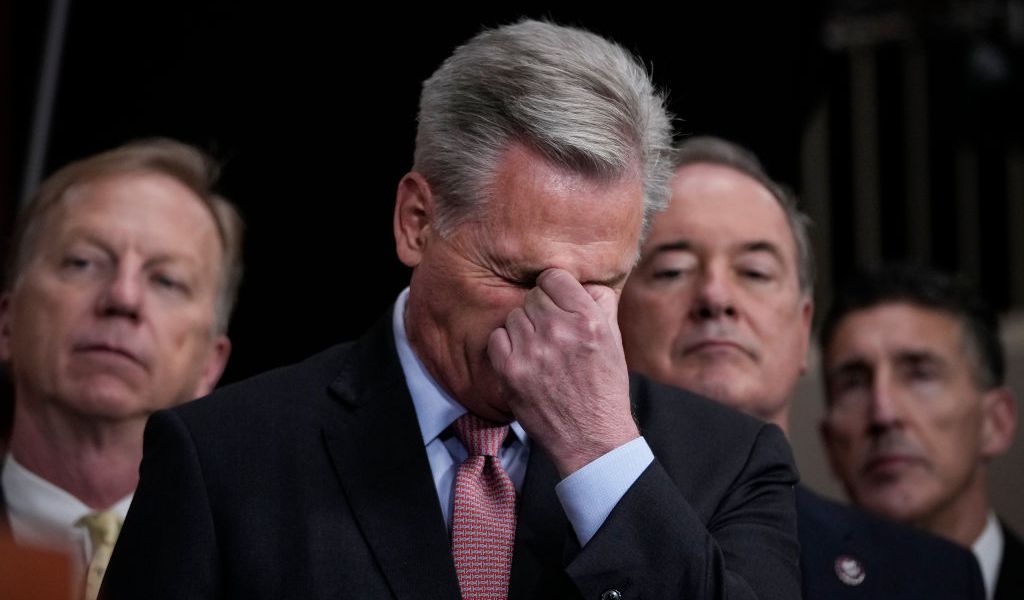The race for the next Speaker of the United States House of Representatives will continue for a fourth day after lawmakers voted to adjourn proceedings on Thursday evening following a historic 11th ballot loss for Republican Kevin McCarthy amid a tense impasse in Washington.
Despite McCarthy’s last-ditch efforts to subdue opposition and secure the votes he needs to be elected House Speaker, 20 Republicans repeatedly voted against him, denying him the simple majority he needed to win the gavel.
The protracted stalemate revealed long-simmering tensions within the Republican party and prompted speculation about how lawmakers might chart a way forward. McCarthy has resisted calls for him to step down in favor of another Republican, and Democrats have declined suggestions that they might support McCarthy or collaborate with Republicans to select a new Speaker.
Late Thursday night, a slim majority of lawmakers agreed to adjourn, setting the stage for a new round of voting on Friday at noon. The House began voting on Tuesday, but no consensus has been reached.
The House of Representatives is required by the Constitution to select a Speaker before it can move on to legislative business.
Kevin McCarthy Needs 218 Votes
McCarthy made history by becoming the first candidate for Speaker in a century to require multiple rounds of voting. In 1923, there were nine voting rounds. Some of the rebels have personal grievances with McCarthy, while others have demanded rule changes that would facilitate McCarthy’s ouster.
After months of negotiations, it appeared on Thursday that McCarthy had agreed to change the rules so that only one member of the House could request a vote of no confidence. However, the changes did little to move the dial and bring him closer to the 218 votes needed for a simple majority in the chamber.
The Republicans regained control of the House of Representatives in the midterm elections of November. McCarthy is in a difficult position because the “red wave” he predicted did not materialize and Republicans hold a razor-thin majority in the chamber, leaving him dependent on a small number of rebels.
The Club for Growth, an ultra-low-tax organization, and the Congressional Leadership Fund, a McCarthy-aligned fundraising organization, announced late Wednesday that they had reached an agreement whereby the latter would not spend money on open Republican primaries in safe seats.
Trump VOTE FOR KEVIN
The agreement was viewed as a victory for conservative Republicans who had previously objected to McCarthy’s efforts to support more centrist candidates. McCarthy received an apparent boost earlier on Wednesday when former US president Donald Trump issued a ringing endorsement of his candidacy, declaring:
“It’s now time for all our GREAT Republican House members to VOTE FOR KEVIN, CLOSE THE DEAL, TAKE THE VICTORY!”
Trump’s efforts failed to sway the dissenters, which is the latest indication that his influence within the party is waning. One of the Republican rebels, Lauren Boebert, referred to Trump as her “favorite president” but said he should be urging McCarthy to withdraw.
Some of McCarthy’s allies have also urged the California congressman to step down in favor of a consensus candidate who could unite the party’s warring factions. Steve Scalise, a congressman from Louisiana and McCarthy’s deputy, has been proposed as an alternative by a number of members, both publicly and privately.
Despite suggestions that Democrats and a group of Republicans could band together to support an alternative Speaker candidate, Democratic leaders have shown little willingness to help break the impasse. Instead, Democrats voted unanimously in favor of Hakeem Jeffries, who took over as party leader in the House after Nancy Pelosi announced her intention to step down.
Source: FT, VOR News








